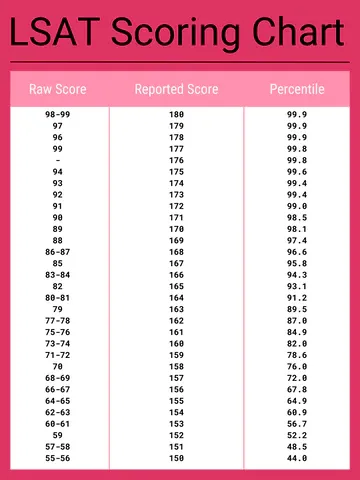The LSAT, or Law School Admission Test, is a standardized test used by law schools to evaluate applicants' skills in areas like reading comprehension, analytical reasoning, and logical reasoning. As a prospective law student, one of the most important things you can do is prepare for the LSAT and aim for a good score. But what exactly is considered a good LSAT score?
In this blog, we'll take a closer look at what LSAT scores mean, how they're used by law schools, and what you should aim for as you prepare for the test.
Understanding LSAT Scoring
The LSAT is scored on a scale of 120 to 180, with 120 being the lowest possible score and 180 being the highest. Your LSAT score is based on the number of questions you answer correctly out of the total number of questions on the test, which is typically between 99 and 102.
The raw score is then converted into a scaled score, which takes into account the relative difficulty of the questions on the test. This means that a raw score of 85 might translate to a scaled score of 165 on one test, but a scaled score of 170 on another test, depending on the relative difficulty of the questions.
Law schools typically use your highest LSAT score when evaluating your application, although some schools will consider all of your scores. This means that if you take the LSAT more than once, you have the opportunity to improve your score and potentially increase your chances of admission to your desired law school.

What Is Considered a Good LSAT Score?
Now that you understand how LSAT scoring works, let's take a closer look at what law schools consider to be a good LSAT score. It's important to keep in mind that what's considered a good score will vary depending on the specific law school you're applying to, as well as other factors like your undergraduate GPA and work experience.
However, as a general rule, a good LSAT score is typically considered to be in the range of 160 to 180. This range represents the top 20% of test takers and is typically the minimum score needed to gain admission to a top-tier law school.
That being said, a score of 150 to 159 is still considered to be a competitive score, particularly if paired with a strong undergraduate GPA and other application materials. A score below 150 may make it more difficult to gain admission to a top law school, although there are still many law schools that accept students with lower LSAT scores.
It's also worth noting that some law schools place less emphasis on LSAT scores and more emphasis on other factors like work experience, extracurricular activities, and letters of recommendation. This is particularly true for schools that are committed to increasing diversity in the legal profession, as research has shown that LSAT scores can be influenced by factors like socioeconomic status and race.

Preparing for the LSAT
Now that you know what's considered a good LSAT score, let's talk about how to prepare for the test and maximize your chances of achieving a high score.
First and foremost, it's important to give yourself plenty of time to prepare for the LSAT. Most test takers spend several months studying for the test, although the amount of time needed will vary depending on your baseline level of knowledge and the score you're aiming for.
There are many LSAT prep courses and materials available, both online and in person. These courses can be expensive, but they can also be extremely helpful in providing you with the strategies and practice you need to succeed on the test.
In addition to taking an LSAT prep course, there are a few other things you can do to maximize your chances of achieving a good LSAT score. One important thing is to take practice tests and review your performance carefully. This will help you identify your strengths and weaknesses and develop a targeted study plan. You can find practice tests and other study materials online, or you can purchase LSAT prep books that include practice tests.
It's also a good idea to develop a study schedule and stick to it as much as possible. This will help you stay on track and ensure that you're putting in enough time and effort to see improvement. Be sure to include breaks and time for rest and relaxation, as well, to avoid burnout.
Finally, make sure you're taking care of yourself physically and mentally. Eating a healthy diet, getting enough sleep, and staying active can all help you perform better on the LSAT. Additionally, practicing stress-management techniques like meditation and deep breathing can help you stay calm and focused during the test.

Conclusion
In conclusion, a good LSAT score is typically considered to be in the range of 160 to 180, although what's considered a good score will vary depending on the specific law school you're applying to, as well as other factors like your undergraduate GPA and work experience. However, it's important to remember that LSAT scores are just one factor that law schools consider when evaluating your application.
To maximize your chances of achieving a good LSAT score, give yourself plenty of time to prepare, take practice tests and review your performance, develop a study schedule and stick to it, and take care of yourself physically and mentally. With dedication and hard work, you can achieve your goals and take the first step toward a rewarding career in law.
Here Are Some Frequently Asked Questions (FAQs) About LSAT Scores and Preparation:
What is the LSAT?
The LSAT (Law School Admission Test) is a standardized test that is required for admission to most law schools in the United States and Canada.
What is a good LSAT score?
A good LSAT score is typically considered to be in the range of 160 to 180, although what's considered a good score will vary depending on the specific law school you're applying to, as well as other factors like your undergraduate GPA and work experience.
How is the LSAT scored?
The LSAT is scored on a scale of 120 to 180, with 180 being the highest possible score. The test consists of multiple-choice questions in four sections: analytical reasoning, logical reasoning, reading comprehension, and an unscored writing sample.
How long should I study for the LSAT?
The amount of time you should study for the LSAT will depend on your starting point and your goals. Generally, it's recommended that you give yourself at least three to six months to prepare for the test.
How important is the LSAT score in law school admissions?
The LSAT score is an important factor in law school admissions, but it's not the only factor. Law schools also consider your undergraduate GPA, work experience, personal statement, and letters of recommendation, among other things.






